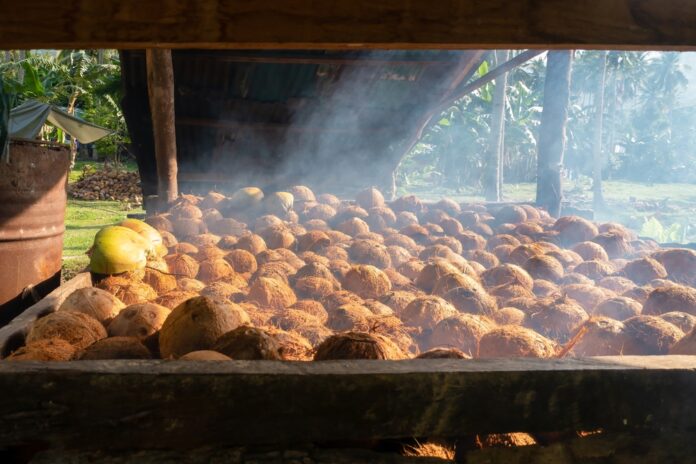The Philippine Coconut Authority (PCA) is taking swift action in response to the soaring price of copra, cooking oil, and other coconut-based products, which have escalated since mid-2024. A consultation on 5 April 2025 gathered major industry players from coconut oil milling, refining, desiccating, and oleochemicals, seeks to stabilize prices and mitigate the impact on consumers.
According to the PCA, the average farmgate price of copra reached ₱58.10 per kilogram as of 31 March 2025—a 109.8 percent increase from ₱27.69 per kg in the same period last year. The price spike has led to more expensive coconut oil and other commodities that now range from ₱172 to ₱182 per kg at the mill gates. The rising prices are a concern for Filipino households as they drive broader food inflation.
PCA administrator Dexter Buted expressed alarm, saying, “The Philippine coconut industry is at a critical juncture… If not addressed urgently, the rising costs of copra and coconut oil could strain the operations of processors and ripple into widespread food inflation affecting every Filipino household.”
The surge in copra prices has triggered a rise in the retail price of refined coconut oil that now costs consumers between ₱173.90 and ₱168.83 per liter, depending on the supplier. Amid these developments, the PCA is exploring measures like intensified monitoring of export activities and pushing for a re-evaluation of the biofuel blend mandate. Stakeholders also raised concerns over alleged illegal export of mature coconuts, despite an existing ban, exacerbating domestic supply shortages.
The PCA likewise seeks a temporary suspension of the scheduled 1 percent increase in the coco-methyl ester biodiesel mandate, set for October this year, to preserve coconut oil availability for domestic use.
Meanwhile, the Department of Agriculture reports that coconut oil prices in public markets range from ₱30 to ₱180, depending on the quantity. In response to the crisis, the PCA emphasized the need for government collaboration, including tapping the Department of Labor and Employment’s welfare programs to support struggling coconut farmers and improve coconut yields.
In 2024, the Philippines produced 14.5 million metric tons of husked coconuts, a 2.6 percent decrease from the previous year. Efforts to re-establish the country as top exporter of coconuts are underway, with plans to plant an additional 100 million coconut trees by the end of the Marcos administration.
As the country grapples with rising coconut product prices, the PCA commits to address these issues with data-driven policies and stronger partnerships to protect the industry and consumers from volatile market conditions.







